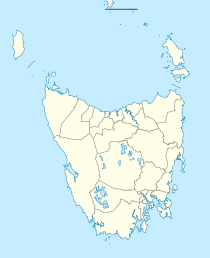Boyer, Tasmania facts for kids
Quick facts for kids BoyerTasmania |
|||||||||||||||
|---|---|---|---|---|---|---|---|---|---|---|---|---|---|---|---|
| Population | 40 (2016 census) | ||||||||||||||
| Postcode(s) | 7140 | ||||||||||||||
| Location |
|
||||||||||||||
| LGA(s) | Derwent Valley, Brighton | ||||||||||||||
| Region | Hobart, South-east | ||||||||||||||
| State electorate(s) | Lyons | ||||||||||||||
| Federal Division(s) | Lyons | ||||||||||||||
|
|||||||||||||||
Boyer is a small country area in Tasmania, Australia. It's located on the eastern side of the River Derwent, across from the town of New Norfolk. In 2016, only about 40 people lived there, making it a very quiet place! Boyer is part of two local government areas: Brighton and Derwent Valley. It's about 18 kilometers (11 miles) south-west of Brighton.
Contents
History of Boyer
How Boyer Got Its Name
Boyer became an official locality (a defined area) in 1970. The area was named after a family who first settled there in the early 1800s.
The Famous Boyer Paper Mill
One of the most important parts of Boyer's history is the Boyer Mill. This large factory was built in 1941 by a company called Australian Newsprint Mills. It was special because it made newsprint (paper for newspapers) and magazine paper (paper for magazines).
What made the Boyer Mill truly amazing was that it was the first paper mill in the entire world to use hardwood trees to make newsprint! This was a big deal for engineering and manufacturing. Because of this important achievement, Engineering Heritage Tasmania has recognized the Boyer Mill as a national engineering landmark.
For many years, the paper made at the mill was sent by tugboats and barges down the river to the port in Hobart. Today, all the paper is transported by road or by train.
Geography of Boyer
The River Derwent
The River Derwent forms the southern edge of Boyer. This river is a very important natural feature in the area.
Getting Around Boyer
Main Roads in Boyer
The main road that goes through Boyer is called Boyer Road (also known as Route B10). It runs from the east to the west side of the area.
 | Chris Smalls |
 | Fred Hampton |
 | Ralph Abernathy |


